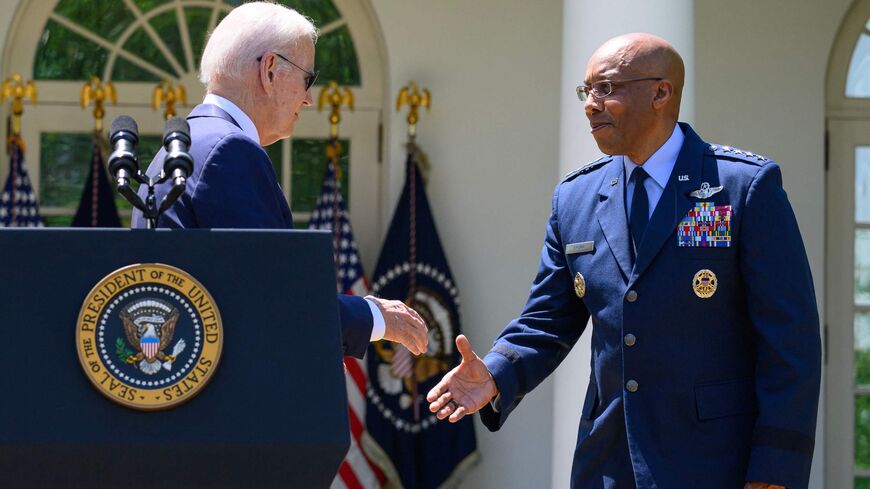WASHINGTON — President Joe Biden on Thursday announced his nomination of US Air Force Gen. Charles “CQ” Brown to become the next chairman of the Joint Chiefs of Staff to replace the Pentagon’s current top general, Army Gen. Mark Milley.
If confirmed by the Senate, Brown would become Biden’s closest military adviser at a time when the United States is hastening to modernize the military’s joint force to head off potential conflict with China following two decades of counterinsurgency wars in the Middle East.
As the first Black chief of staff of the US Air Force, Brown has become known as an innovator who pressed the service to trim down on bureaucracy while adapting to new capabilities in joint warfare.
“Since [Operation] Desert Storm, the US Air Force has enjoyed a historically anomalous period of dominance,” Brown wrote in a 2020 manifesto entitled “Accelerate, Change or Lose.”
“These assumptions no longer hold true today,” Brown wrote. “We are now seeing competitors outpace our current decision structures and fielding timelines.”
It’s a message that has resonated with President Biden and his National Security Council.
“General, you’re right on,” Biden said during Brown’s nomination ceremony in the Rose Garden on Thursday. “As I’ve often said, our world is at an inflection point where the decisions we make today are going to determine the course of our world for decades to come,” the president added.
Former US officials who spoke to Al-Monitor described Brown as an ideal candidate as the Pentagon seeks to keep pace with China’s rapid advances, noting that the general also brings experience navigating a delicate balance of powers in the Middle East at a time when US forces are spread thinly in the region following withdrawals from Afghanistan and Iraq.
Brown, who oversaw US Air Force units in the Middle East starting in 2015 and became the deputy CENTCOM commander during the US-led coalition war against the Islamic State (IS), had previously served as director of operations and strategic deterrence at US European Command following Russia’s invasion of eastern Ukraine.
His tenure at CENTCOM coincided with a blistering US-led bombing campaign against IS that has been criticized for resulting in civilian casualties. Under Defense Secretary Lloyd Austin, the Pentagon has vowed to reform its approach to documenting and reducing harm against civilians.
As chief of staff of the Air Force this past January, Brown traveled to Qatar, the United Arab Emirates and Jordan to throw his support behind CENTCOM’s initiatives in the region — chief among them encouraging regional governments to work together on shared air defense and the experimentation with commercially available drone technology and artificial intelligence.
As the Pentagon has pulled troops and a number of heavier US weapons systems from the Middle East in recent years in order to be ready elsewhere in the world, CENTCOM has been experimenting with unmanned sensors linked via distributed mesh communications networks in a bid to expand surveillance and intelligence gathering in the region’s hotspots.
CENTCOM’s initiatives, including the Air Force’s Task Force 99, are designed to find new ways around the Pentagon’s bloated acquisitions bureaucracy — which Brown has expressed as key priority in keeping pace with US adversaries.
Pentagon officials expect such emerging capabilities to be increasingly valuable in case of future conflict with China over Taiwan — a contingency Brown insisted in February is neither imminent nor inevitable.
“The goal is to avoid it. And so not knowing when things might occur, my goal is to be ready today, tomorrow, next week, next year, next decade,” he said.
It was Brown’s experience as the top commander of US Air Force units in the Pacific that proved instrumental in the White House’s decision, The New York Times reported. Biden’s choice, which was first reported by Politico earlier this week, came at the recommendation of Defense Secretary Lloyd Austin.
Brown “is a highly experienced, decorated and respected US Air Force officer with the right character to be the most senior military adviser to the President of the United States,” said Mick Mulroy, former Pentagon policy director for the Middle East.
Mulroy noted Brown’s history as an F-16 and F-22 Raptor pilot — "experience that will be very valuable in the type of conflict currently taking place in Ukraine and potentially that could take place in Taiwan.”
The Biden White House has largely adopted and built upon the previous administration’s 2018 National Defense Strategy, which prioritized Russia and China as adversaries that were rapidly gaining on the US’ military superiority, and thus were increasingly capable of threatening the post-World War II international order enforced by Washington.
But the Trump administration’s decision to withdraw from the 2015 nuclear accord with Iran in 2018 led to a cycle of escalation with the Islamic Republic that resulted in major US military deployments back into the Middle East at the end of the war against IS, throwing off Washington’s timeline to prepare for contests with Beijing and Moscow.
Brown is unlikely to face the heated internal debates over deployments to the Middle East that his predecessors faced during the Trump administration, experts said.
“For the first time in a long time, there’s real synchronicity between OSD [Office of the Secretary of Defense], CENTCOM and the National Security Council on what US military engagement in the Middle East should look like,” said Jonathan Lord, director of the Middle East Security Program at the Center for a New American Security, a Washington-based think tank.
Yet conflicts in the region have never abided by Washington’s timelines. Israeli national security officials are increasingly worried over Iran’s capabilities surrounding its nuclear program and potential weaponization, Al-Monitor has reported.
“The CENTCOM region holds the greatest risk of derailing the National Defense Strategy with a flashpoint international incident that may demand a response using unplanned resources and attention,” the commander of all US forces in the Middle East, Gen. Michael “Erik” Kurilla, told lawmakers in March.
In January, CENTCOM’s Air Force component staged the largest-ever combined war games with Israel culminating in simulated long-range strikes against strategic targets. Former US officials described the exercise as representative of the Pentagon’s operational plans to strike at Iran’s nuclear sites.
Pentagon officials downplayed the Iran angle, however, touting the event as a successful rapid deployment of overwhelming US force into the region on short notice without relying on long-term deployments.
During Brown’s tenure as Air Force chief of staff, the service implemented a new approach known as Agile Combat Employment, in which US air forces would deploy rapidly between clusters of smaller bases rather than being centered at major hubs.
“Fundamentally changing the way we generate air-power will complicate adversary planning and provide more options for our joint force and coalition commanders,” Brown said last year. “Our approach to operations over the past 20 years has prioritized efficiency in an environment that is not highly contested.”







